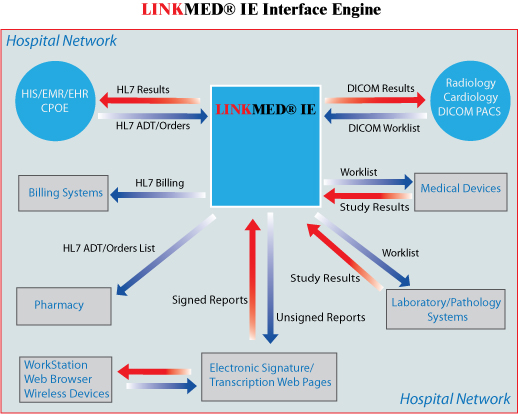LINKMED® IE HL7- DICOM Interface

LINKMED® IE Features:
1- Communication:
LINKMED® IE HL7 TCP/IP Communication Drivers communicate with remote system through TCP/IP socket connections. HL7 messages can be wrapped using HL7 MLLP protocols or user-defined protocols (headers and trailers). The LINKMED® HL7 TCP/IP Drivers communication protocols are configured in the drivers configuration dialog box.
LINKMED® IE HL7 TCP/IP Communication Drivers can send and receive information in virtually any formats over any protocols, effectively bridging other systems with the LINKMED® IE Interface environment.
DICOM- PACS Communication: Use to querry PACS for DICOM workllist and send DICOM Study Reports to PACS
- Accepts all HL7 message types and automatically validates and sends standard HL7 message acknowledgements back to client(s).
- Accepts multiple connections on the same port and route messages to user-defined destinations.
- Accepts HL7 query messages and sends HL7 query response messages.
- Can be configured for application level message validation.
- Built-in firewall allows the receiver to accept message from allowed IP address only (up to 50 IP addresses).
- Can be configured to receive non-HL7 message sends via TCP/IP user-defined protocols such as XML documents, Words documents, PDF documents, etc.
- Reads, Writes and filters HL7messages to SQL database or LINKMED® internal interface database.
- Runs unobstructively as service.
- Sends HL7 result and query messages.
- Receives HL7 acknowledgements and HL7 query response.
- Can be configured to send message length and size encoding prior to sending actual HL7 message.
- Automatically re-send message if no acknowledgement is received or remove message out of the queue.
- Can be configured to send non-HL7 message via TCP/IP user-defined protocols such as XML documents, Words documents, PDF documents, etc.
- Native support for standard HL7 ( All version 2.xx ) HL7 version 3 ready when available, supports other standard messaging format such as: XML, ASTM, ASCII, CSV, NVP, SQL and user- defined.
- Graphical user interface (GUI) allows user to visually learn its user friendly functionalities in order to create an interface template.
- Mapping data from one format to virtually any another format including "What you want" format.
- Built-in HL7 message library (All HL7 Version 2.xx).
- Supports new ASTM CCR and HL7 CDA.
- Internal intermediate database for storing un-needed data but needed to re-create HL7 result messages to send back to the HIS or EMR systems in bi-directional interface.
- Featuring GUI "Mapper Rules" uses for data manipulation such as moving value from one filed to another or concatenate data from many fields and output into one field.
- HIS, EMR, EHR systems send HL7 messages to LINKMED® IE interface.
- LINKMED® IE HL7 TCP/IP Receiver receives and sends HL7 message acknowledgements.
- LINKMED® IE Receiver processes HL7 messages to vendors format.
- Patient demographics are imported to vendors applications or systems.
- Patient demographics and others information are stored in LINKMED® IE intermediate database.
- In Bi-directional interface LINKMED® IE can assigned unique key identifiers (UKI) used for study result reconciliation with order.
- LINKMED® IE Interface accepts HL7 ADT updates to study order (ORM) automatically.
- Automatically updates order (ORM) information when receiving ADT patient merged message(supports both merge patient ID or merge patient account numbers or both ). 4- Outbound Interface Workflows:
- Lab results, Diagnostic studies or Transcribed reports received back from Vendors systems are reconciled with HL7 ADT/Order information's stored in the LINKMED® IE interface intermediate database.
- HL7 result messages (ORU)or Documentation (MDM) messages are created only if all records unique key identifiers are matched.
- Reports with unmatched unique key identifiers are processed for later reconciliation with ADT or Order send later from the HIS, EMR, EHR or OE systems.
- Study reports can be viewed and print from LINKMED® WebSelect client.
- HL7 result (ORU) or Documentation (MDM) messages are configured (Customized) according to client's specifications (down to HL7 field level). 5- Implementing the Interface:
- HIS, EMR, EHR Systems send HL7 ADT /Order message to LINKMED® IE Interface.
- LINKMED® IE Processed HL7 ADT/Order Messages and inserted the data into client database or passed to a shared location folder for vendor's application to import.
- Study Reports are automatically processed by the LINKMED® IE to HL7 Result messages
- DICOM Study Report can be created and send to PACS Systems (both in SR and ESR format)
LINKMED® IE HL7 TCP/IP Transmitter Features:
The LINKMED® IE HL7 TCP/IP drivers can send and receive information in virtually any format over many TCP/IP protocols, effectively bridging other systems with the LINKMED® Interface environment.
2- LINKMED® IE Dynamic Message Mapper:
Messaging and Mapping tools uses for system's integration and data exchange between system. Users use LINKMED® IE Mapper to create system interface templates for their applications and/or systems.
LINKMED® IE Dynamic Message Mapper Features:
3- Inbound Interface Workflows:
LINKMED® IE processed filtered and reformatted HL7 and non-HL7 format to other file format by reading the Interface template.
Inbound HL7 interface workflows:
The LINKMED® IE processed and reconciled study reports with previously received HL7 ADT/Order messages, then creates HL7 result messages (ORU or MDM) to be sent back to the HIS, EMR or EHR systems.
The following are LINKMED® IE default Outbound HL7 interface workflows:
LINKMED® IE Interface with the following systems
- McKESSON STAR series 2000, HPF
- SIEMENS SMS,OPENLink, Invision, UNITY, Soarian®
- MEDITECH, ITS, MAGIC(Client/Server)
- AllScripts-MISYS, Eclipsys SCM
- Cerner CareConnection, Millennium, PowerChart®
- MedPlus ChartMaxx
- Epic Systems Corporation: HyperSpace (Spring 2006:R1 R2)
- GE Centricity (IDX)CareCast/LastWord
- Quovadx (cloverleaf)
- Sun SeeBeyond eGate
- HL7 compliant systems
System Requirements
- Intel Pentium Dual Core or Compatible Server running on Windows® server 2000/2003/2008/2012/2014/2016 4-8 GB RAM or
- Intel Pentium IV Class or Compatible Interface PC running on Windows® XP Pro/Win 7 Pro/Win 10 Pro 4GB RAM
- VMware® Server compatible
- 100 GB + Hard Disk space
- 10/100/1000 LAN
- CD/DVD ROM
- Microsoft® Internet Information Services (IIS) enable
- Web Browser
Toll Free: 1+ 888-893-0900
